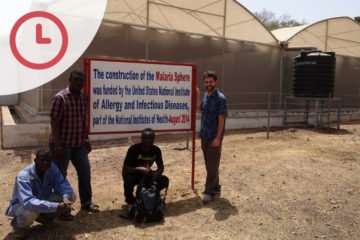Podcast Available on iTunes and Spotify.
Welcome back. Joining me today is Margaret Reilly McDonnell, the Executive Director of Nothing But Nets.
Margaret, thank you so much for joining me.
Absolutely, thanks so much for inviting me, it’s wonderful to speak with you today.
Why are mosquito nets so important?
Well, mosquito nets are critical because we know that, despite tremendous progress, a child still dies from malaria every two minutes. We know that half the world’s population is at risk of malaria and about 70% of those are children under five. And we know that the Anopheles mosquito, responsible for malaria, or the primary form of malaria, bites at night. And so people who are most vulnerable to contracting malaria at night time. And so we know that, through the distribution of bed nets combined with other interventions like spraying and diagnostics and treatment, we’ve been able to make tremendous progress in the fight to end malaria.
How do you decide which areas need mosquito nets?
We work to ensure that no one is left behind in the fight to end malaria, which is why we really primarily work with our U.N. partners such as UNHCR and UNICEF to help protect refugees and vulnerable populations. They are people who tend to be left behind frankly and are really hard to reach. So we help to ensure that they have access to bed nets, malaria tests and treatment. Many of them have fled slight conflict, been displaced by natural disasters, political unrest and have had to leave everything behind.
And how effective are mosquito nets?
Mosquito nets are extremely effective. They’ve been an invention that has really contributed to, they say about 68% of the progress made against malaria over the last 10, 15, 20 years has been because of bed nets. Interestingly despite our name Nothing But Nets, we actually provide more than bed nets. Bed nets continue to be kind of our bread and butter. But we also work with communities and partners on the ground to determine their greatest need. What’s most needed to address malaria in their community and countries.
There is growing resistance to the insecticides used in mosquito nets. How are you addressing this issue of growing insecticide resistance?
Right, well thank you for raising it. That’s a really important question and issue and we take the threat of insecticide resistance very seriously. So we really look to our partners in the scientific and private sector as well as other international organisations to develop and test new insecticidal products. So we have a number of partners that have actually developed tools and bed nets specifically that work to address the insecticide resistance by including additional chemicals, and we’re proud to partner with them. We’ve actually helped to fund a pilot program, testing out a new net in South Sudan.
There have been cases where people who were given mosquito nets misused them, they used them to wrap around their tomatoes or they used them to make wedding dresses. Do you believe that more needs be done with regard to educating people how to use mosquito nets properly?
That’s a great question. We know, and WHO has shown, that around 90% of people who are provided an insecticide-treated bed net use it properly for its intended use. Part of our work is not just handing people mosquito nets but helping to fund distribution, education and behaviour change communication that goes with that and some of the follow-up and monitoring evaluation that needs to follow to ensure that bed nets are being used properly. Certainly, education around the proper use of that net is absolutely critical.
Do you believe that the current political situation in the U.S. threatens to halt some of the progress that could be made in malaria eradication?
There have been attempts by the Executive Branch to make significant cuts to international and foreign assistance including global programs, including malaria. Fortunately, because Congress has offset those threats and has chosen to fund malaria programs and programs like The Global Fund and The President’s Malaria Initiative at current levels. I think Congress knows that there is a number of reasons to be involved the fight against malaria, whether it’s for morals, for public health or national security. Foreign assistance altogether is less than 1% of the U.S. budget and so we know that a relatively minor investment has a tremendous return on investment, tremendous ROI in terms of lives saved.
Margaret Reilly McDonell, thank you.
Thanks so much for your time.


